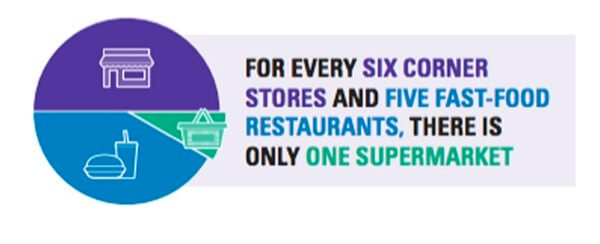By Naeisha Rose
Corona, Jackson Heights and Jamaica were identified as food swamps in a report from Public Health Solutions, one of the largest public health nonprofits in New York City dedicated to helping families through research in order to help them thrive.
Public Health Solutions was established by the city’s Department of Health and Mental Hygiene in 1957.
In the summer and the fall of 2014 eight data collectors examined 3,661 sites across the three neighborhoods and discovered that fast food joints and corner stores outnumbered supermarkets that provided fresh food in those areas.
For every one supermarket, there were six corner stores and five fast-food restaurants, according to the research.
Limited access to fresh food is not only a detriment to the health of an individual, according to the organization, but also to the overall health of a community.
“When we think about the avenues for achieving health and wellness, we don’t often take into consideration the health disparities that are built into the geographic areas in which we live,” said Lisa David, president and CEO of Public Health Solutions. “We take for granted that healthy food options—even those as basic as supermarkets are available and accessible, but this isn’t the reality for many New Yorkers.”
Corona had the most supermarkets (29) out of the three neighborhoods, but also the most fast food places (146) and corner stores (160). Jamaica had the fewest corner stores (114) and fast food places (97) as well as the least supermarkets (11). Jackson Heights fell in the middle in terms of supermarkets (27), corner stores (143) and fast food joints (125).
At the time of the report neither Jamaica nor Jackson Heights had a farmers market, and Corona had one, and all three regions had more liquor stores than fruit and vegetable carts and stores selling produce.
Another threat to the well-being of the communities highlighted during the 2014 research was the number of vacant lots, which the nonprofit associated with leading to higher incidences of crime that could affect the neighborhoods.
Jamaica had 40 vacant lots, Jackson Heights had seven and Corona had eight, according to the data. The empty lots outnumbered the amount of community gardens in two out of the three areas. In the research Jackson Heights did not have a community garden at all.
While the vacant lots were seen as a threat to the prosperity of each neighborhood, the nonprofit suggested each had the potential to better the area, for example, if they were transformed into community gardens.
“Laying the ground work for thriving and healthy communities across New York City requires a multi-pronged approach: first, identifying and bringing awareness to local issues, and second, working with communities to develop impactful solutions,” said Sabrina Baronberg, senior director of food and nutrition programs at Public Health Solutions.
The only businesses to outnumber the fast food restaurants, corner stores, liquor stores and vacant lots were beauty salons.
Jamaica had 173 beauty salons, Corona had 179 and Jackson Heights had 191.
Public Health Solutions suggested reaching out to the business owners of beauty salons to foster community health and having their employees act as wellness advocates by distributing public health materials and resources.
“This report provides a key resource for understanding what additional public health support is needed for residents in Jackson Heights, Corona, and Jamaica, and outlines ways in which we can engage with local businesses to improve health outcomes.”
Reach reporter Naeisha Rose by e-mail at nrose































